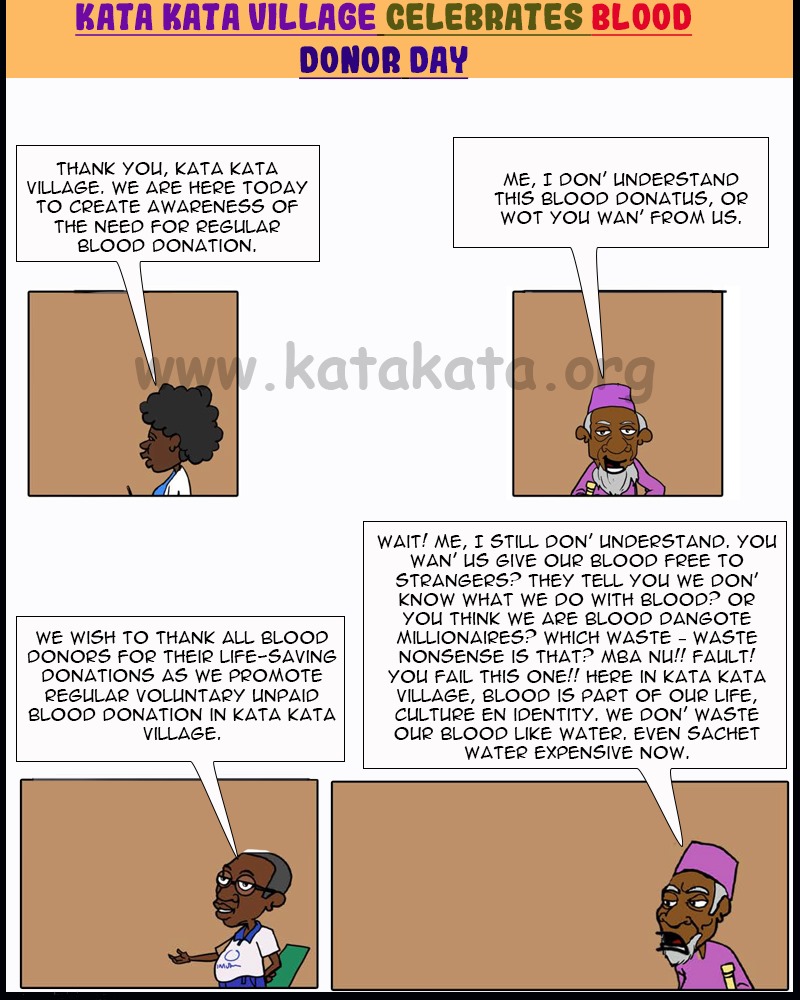Blood Donor Day in Kata Kata Village: A Story of Life, Culture, and Compassion.
Medically speaking, blood is not just a fluid; it is
the essence of life. The invisible force sustains the human body by
transporting oxygen and nutrients to vital organs, delivering immune cells to
fight infections, regulating body temperature, and even forming clots to
prevent excess blood loss. From kidneys filtering waste to lungs absorbing
oxygen, none would be possible without blood.
Yet, blood holds deep cultural and symbolic meaning
beyond its biological importance. It is sacred in many traditions, signifying
lineage, identity, ancestry, and life. It is not just something inside the body
but part of who we are. In rituals, it can be a powerful emblem of healing,
protection, or familial bonds. For the people of Kata Kata Village, blood is
not merely a biological matter but a sacred thread that ties generations
together. This rich cultural heritage is something to be proud of and deeply
connects us to our past and future.
So, when officials from the United Nations suddenly
arrive in Kata Kata Village to mark World Blood Donor Day, they know
they're not just stepping into a medical outreach - they're in a culture where
blood is jealously revered and guarded.
As we celebrate World Blood Donor Day every June 14,
we can campaign and create awareness about the need for safe blood and blood
products. More than that, we thank voluntary, unpaid blood donors who save
millions of lives through their priceless help. Today, we experience blood
shortages globally, which puts lives at risk, especially during emergencies
such as war, surgeries, childbirth, and when treating diseases like cancer and
anaemia. Although we might be helpless in ending the wars or preventing other
calamities, we can still do something to address the situation. Our small
widow's mite amid global madness and catastrophes. Unfortunately, some of us
are unaware that a single blood donation can save up to three lives. Sadly,
even though this noble cause is easy to achieve, not everyone is ready or
willing to give blood.
In most cases, as in many communities globally, this
reluctance has less to do with fear of needles or hospitals; instead, it is
rooted in centuries of cultural belief. Yes, the cultural belief that blood is
a symbolic natural gift binds people with their ancestors and provides clarity
and meaning to their existence. Therefore, the blood is not something to be
given out freely but protected and preserved jealously. Giving it away freely
seems almost unnatural, if not dangerous. "Haba! Your head correct? You
wan' just give your life to strangers? Even our ancestors will protest if they
hear that." Kata Kata Village Chief warns.
Imagine being in the same dicey situation as the
U.N.O. medical team that visits Kata Kata Village. Faced with this vehement
mindset and scepticism against blood donation, the medical team will soon
realize they are facing a mountainous task trying to convince the villagers to
donate their blood. However, with their deep respect for the villagers'
cultural beliefs, they embark on a journey to change perceptions about blood
donation, inspiring hope and a sense of possibility.
Eventually, with the help of local leaders, the U.N.O.
team launched a series of community events and awareness campaigns to sensitize
the importance of blood donation, which engages the audience and inspires hope
and a sense of possibility, showing that even deeply rooted beliefs can be
changed. Soon, music and dance are also woven into the campaign, transforming
the event into a festive, unifying occasion. Young people begin to see blood
donation not as a loss but as an act of bravery and love. The campaign's climax
comes when local herbalists join the activity, reassuring that donating blood
doesn't weaken a person's spirit or energy -especially when done with the right
food and rest. Others are assured that donating their blood will not affect
their sexual libido, and donors can easily replace their donated blood as long
as they eat well. This celebration of life and unity brings the community
together in a shared cause, fostering a sense of connection and a larger
purpose among the villagers. It makes them feel part of a larger cause and
connected to their community, strengthening their bond and sense of belonging.
Gradually, hesitation turns into curiosity, then
curiosity into action - an action that transforms the old mindset. Rather than
viewing blood donation as an anathema that can destroy the fabric of its
society and cultural continuity, some Kata Kata villagers begin to accept it as
an act that will prolong their existence as a community and, as such, must be
encouraged. This transformation is a testament to the power of education and
understanding, and it gives hope for a future where cultural respect and medical
knowledge work hand in hand.
The event ends with lively drumming, dancing and
symbolic tree planting - a 'Tree of Life,' as the villagers call it. This tree
symbolizes the life-saving potential of blood donation and the
interconnectedness of the community. Under its shade, a plaque reads: 'Blood
is life; to give blood is to give life to our shared future.' This plaque serves
as a reminder of the impact of the day's events and the potential for a
brighter, healthier future for Kata Kata Village.
Kata Kata Village's Blood Donor Day is more than just a campaign. It is a reminder that life, culture, and compassion can coexist—and that sometimes, saving a life begins with telling a story.

